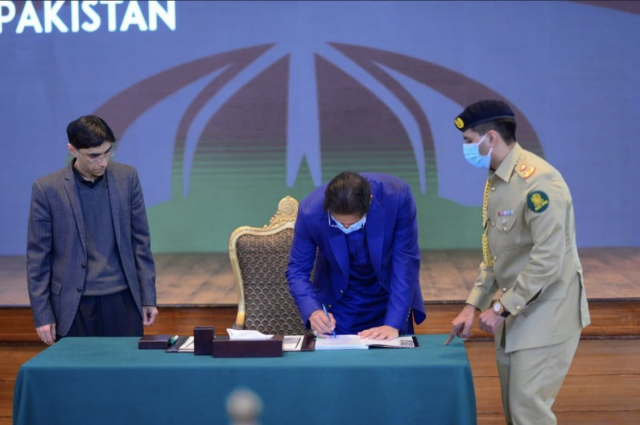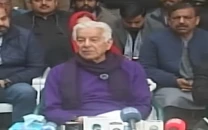Govt open to ‘revisiting NSP’
Parliamentary secretary says valid ideas could still be incorporated

A government representative hinted on Wednesday at the possibility of revisiting the National Security Policy (NSP) after opposition leaders called for a more focused policy that also addressed the underlying causes of political, economic, and social imbalance in the country.
Participating in a dialogue hosted by the Islamabad Policy Institute on the recently unveiled NSP Parliamentary Secretary for Foreign Affairs Andleeb Abbas said that the policy was a living document and the government was open to reviewing it.
“Policies are revisited and reviewed and constructive criticism will be welcomed,” Abbas told the participants, adding that the NSP had been prepared on the basis of government’s viewpoint but valid ideas could still be incorporated.
Read more: Opposition demands placing NSP before parliament
Abbas also said that it was a comprehensive document, but there was room for improvement in it. She emphasised its implementation and pointed out that some of the initiatives that the government had already taken were in line with its objectives.
The discussion was moderated by Iftikhar Shirazi. On the occasion, senior leaders of both the major opposition parties, the Pakistan Muslim League-Nawaz (PML-N) and the Pakistan Peoples Party (PPP), criticised the policy for being “too wordy but containing little substance”.
“NSP, a hollow document that lacks legitimacy and consent from elected representatives, is devoid of a clearly defined implementation framework, and contradicts directly the conduct of foreign and security policies by the hybrid regime since 2018,” said PML-N Vice President Khurram Dastgir Khan.
In this regard, Khan noted that the NSP set out defence of the nation’s sovereignty as its principal aim, but the government compromised the country’s economic sovereignty by bulldozing the State Bank of Pakistan (SBP) Bill in parliament.
He argued that if the NSP’s claim of being “citizen-centric” was to be realised, then resource allocation must be rationalised by balancing defence spending and development. “If this does not happen, the policy is mere a paper,” he maintained.
Also read: NSP and our expanding foreign policy
The former foreign minister felt that the Kashmir dispute was not adequately emphasised in the document and the ground situation in the occupied territory was not fully reflected. He said the document limited itself to just repeating the Foreign Office boilerplate and did not even demand a reversal of India’s actions on August 5, 2019.
PPP Secretary General Farhatullah Babar, meanwhile, said the NSP lacked input from parliament, civil society, therefore, it was neither inclusive nor participatory – a basic condition for a true national policy. “It is an expression of pious hopes, vague promises, and resting on borrowed cliches,” he added.
He regretted that much like the formulation of the NSP without taking parliament on board, the government had without any political consultations and debate drastically changed the National Action Plan (NAP) and rendered the National Counter Terrorism Authority (Nacta) dysfunctional.
The NSP, he contended, claimed “to leverage the symbiotic relationship between human security, economic security and military security,” but failed to recognise that human security also meant protecting and enhancing human freedoms that were the essence of life.
He called for addressing the issues of institutional imbalance, inequitable resource distribution, non-state actors and deliberate undermining of the democratic institutions. He suggested that a new national policy that must make a clear admission of the failures of the past of the need to “put own house in order” and start with a Truth Commission to chalk out the future path.



















COMMENTS
Comments are moderated and generally will be posted if they are on-topic and not abusive.
For more information, please see our Comments FAQ